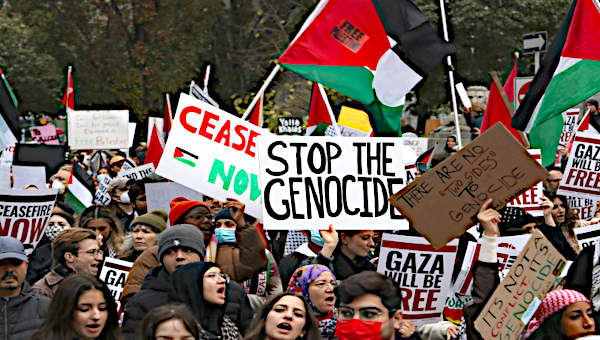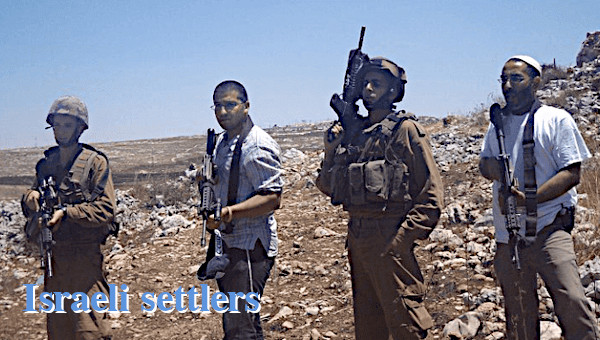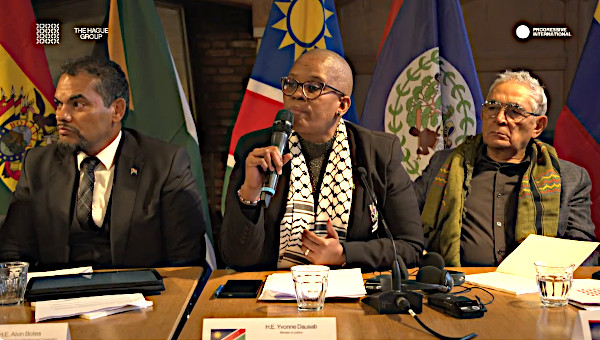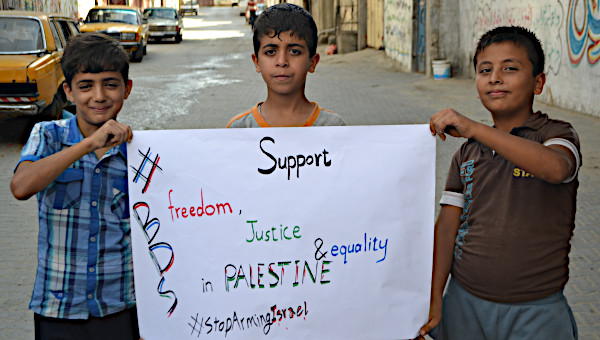“What I am trying to say to you, my friends, comrades, brothers and sisters, is that what we are facing with Israel is a two-headed monster: it is both an imperialist monster, a colonialist monster; but it is also an exterminist state.” — Eqbal Ahmad, speaking on the occasion of Israel’s 1982 invasion of Lebanon.
Things in Palestine have developed far beyond the point where any given “flare-up” in the constant violence that defines Israeli rule can be addressed in isolation. The significance of the ongoing Israeli assault on Gaza has absolutely nothing to do with the tired, dull hasbara talking points being peddled by Israeli diplomats – less still with their enterprising “twitter offensive.” But nor is it simply reflected in the destructive impact of this wave of Israeli state killings. As Eqbal Ahmad put it in a 1982 speech that today rings very true, “What matters is the goal, the actuality, of what the Israelis want.”
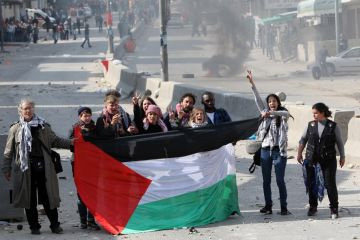 Israel, of course, has no monopoly on the politics of violent domination. But if, as the late Eric Hobsbawm wrote, “most historic empires have ruled indirectly, through native elites often operating native institutions,” in its rule over the Palestinians Israel does not easily fit into this imperial mainstream.[1] As a result, the threat posed by Israeli politics involves dangers much more severe than external dominance and the suppression of genuine independence.
Israel, of course, has no monopoly on the politics of violent domination. But if, as the late Eric Hobsbawm wrote, “most historic empires have ruled indirectly, through native elites often operating native institutions,” in its rule over the Palestinians Israel does not easily fit into this imperial mainstream.[1] As a result, the threat posed by Israeli politics involves dangers much more severe than external dominance and the suppression of genuine independence.
The false promise of conventional imperial rule in Palestine has gotten much public play in recent years. A decade ago, endorsing Israel’s renewed onslaught throughout the occupied territories, President Bush declared (June 2002) that what was needed was “a new and different Palestinian leadership so that a Palestinian state can be born.” A Palestinian “state”!
A Palestinian State?
Of course, if this were the case, some obvious questions arose. Like, why not in the 1990s? The Palestinian Authority (PA) under Yasser Arafat had already been caught in a system of extreme financial dependence on Israel and its superpower sponsor, thanks in no small part to conditional funding from a willing Europe. As it rubbed shoulders with donors, the PA leadership had increasingly demobilized and sidelined the organized mass base of the Palestine Liberation Organization. And by decade’s end, it was clamoring to overcome Israeli objections to the increased involvement of CIA operatives and their close associates in PA affairs.[2] If the objective was a viable client state, what was the problem?
Full Israeli re-invasion of this budding client state, the occupied West Bank and Gaza, thus raised some eyebrows. When Israel moved beyond prisons and bullets to deploy U.S.-supplied F16 fighter jets against the occupied Palestinian population (spring 2001) – the first deployment of warplanes within Palestine since 1967 – no less a dove than Dick Cheney publicly objected. Even after September 11 2001, it took some time for official Western acceptance of this escalation to sink in. With Binyamin Netanyahu, for example, declaring that 9/11 demonstrated the need to “destroy terrorist regimes, starting with the Palestinian Authority,” George W. Bush countered that “the world ought to applaud” Arafat for deploying PA security forces against “radical elements” (October 2001). To the end, CIA director George Tenet objected to the application of “regime change” politics against Arafat’s PA.[3]
Yet there were limits to the Arafat leadership’s indulgence of foreign sponsors – limits to the diplomatic concessions it would make, limits to its willingness to deploy PA forces against Palestinians when they would all be attacked by Israeli military power, regardless. And the days of U.S. (and hence international Western) cooperation with Arafat were numbered.
Karma Nabulsi, speaking on a panel in Boston just after Israel’s 2008-09 assault on Gaza, recalls the ensuing transition to Bush’s “new and different Palestinian leadership”:
“[In] 2005, Mahmoud Abbas (Abu Mazen) ran for the presidency of the Palestinian Authority – this was after the death of Arafat. And if you remember, Arafat had been under a two-and-a-half year siege in his headquarters in Ramallah for very much the same kind of issues that are facing Hamas today. Mahmoud Abbas was elected on a vast popular landslide. And his position was much different from Arafat’s. His position was that we are going to – as Fateh, as a political party, as a president who will lead the negotiations – we are going to entirely rely upon the goodwill of the Israeli government and of the U.S. administration in order to achieve our rights, in order to raise the issues that concern us, and in order to get a peaceful settlement. If any of you remember what happened during that year, Sharon was in power, and Mahmoud Abbas received absolutely nothing. And not only that, was humiliated, and treated with contempt, by the Israeli administration.”
The election of a Hamas majority in the parliamentary votes of early 2006 occurred against this backdrop. The outcome, Nabulsi emphasizes, reflected not the bare popularity of Hamas, but the presence within its electoral platform of the consensual Palestinian positions (on prisoners, on refugees) that the Abbas presidency had set aside under the pressure of external threats and demands.
Under the pressure of a suffocating destabilization campaign jointly pursued by Israel, U.S.-allied donor states, and foreign security personnel, the politics of the occupied West Bank and Gaza were further fragmented in June 2007 – the elected Hamas government effectively confined to Gaza, control of the fragmented PA authority within the West Bank returned to those Palestinian leaders favoured by Israel and the West.[4]
But even as those Palestinians resisting have been punished, the politics of compliance have themselves been allowed to develop only within the narrowest of cages.
Roman Option
To be sure, development of something like a genuine Western protectorate in parts of Palestine has had its prominent advocates. “I firmly believe,” explained the ranking U.S. military commander responsible for the Palestinian file in 2007, “that you make changes in this world the way the Romans did – by being on the ground, by getting your feet dirty in the mud and working with the people on the scene.”[5] And partnered with a compliant West Bank administration, why not? After summer 2007 the influence in the West Bank of the 2006 election results had been nullified; or in other words (those of then Secretary of State Rice), “you now have in the Palestinian territories a democratic leadership.”[6]
Armed with the “Roman option,” the likes of Keith Dayton thus pitched the politics of sustained imperial cooptation to Israeli officialdom. Compliant Palestinian security forces could be developed, brought into the orbit of U.S.-allied protectorate networks in the region, and clear the way for limited Israeli withdrawals that addressed Israel’s stated security concerns. “For the first time,” Dayton kvelled in 2009, “I think it’s fair to say that the Palestinian security forces feel they are on a winning team.”
This message, however, does not resonate all that strongly in predominant Israeli political circles. Leaders considering the Palestine question are much more inclined to play New England Puritans and Pequots than to merely dispatch imperial proconsuls.
When the Obama administration took over, neocolonial dictates were predictable and quick in coming. “The new U.S. Administration,” PA officials were told before Obama even assumed office, “expects to see the same Palestinian faces (Abu Mazen and Salaam Fayyad) if it is to continue funding the Palestinian Authority.”[7] But a question remained: Might a middle path be developed between conventional imperialism and Israel’s settler colonial zeal? Might Israel be seriously pressed to reserve some stable fragments of Palestinian land, and some position of plausible diplomatic dignity, for some kind of Palestinian polity?
Until autumn 2010, it seemed possible. Since, the illusion has faded. Political manipulation by Western donor states continues – but fewer and fewer are taking development of a viable Palestinian protectorate seriously. The vaunted Palestinian-Israeli “bilateral track” stands exposed as the relationship between an occupied population and a pioneering military power intent on brutalizing and suppressing it (at best). And the U.S., true to form, stands vigilant in defense of the sanctity of this fine “bilateral process” against any who would interfere.
Gaza
So what of Gaza? What does it mean when Israel threatens, bombs, and kills to ensure its compliance? Its compliance with what? Note that the territorial and demographic reality that is the Gaza Strip is itself, to begin, an ominous reflection of Israeli colonial strategy to date: “When transfer doesn’t work, concentration is tried.”
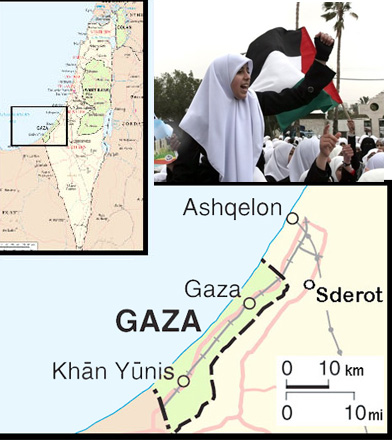 In 1948, the greater part of Palestine’s population was forcefully displaced beyond Israel’s pre-1967 sphere of control to clear the way for Israel’s anachronistic pioneering. A great number of the “transferred” ended up in the Gaza Strip. Their nearby existence quickly gave rise to an abiding Israeli wish: “If I believed in miracles,” declared David Ben-Gurion in an October 1956 Knesset speech, “I would pray that Gaza would be washed down into the sea.”[8] After 1967, Gaza’s inhabitants not only remained above water but came under direct Israeli rule.
In 1948, the greater part of Palestine’s population was forcefully displaced beyond Israel’s pre-1967 sphere of control to clear the way for Israel’s anachronistic pioneering. A great number of the “transferred” ended up in the Gaza Strip. Their nearby existence quickly gave rise to an abiding Israeli wish: “If I believed in miracles,” declared David Ben-Gurion in an October 1956 Knesset speech, “I would pray that Gaza would be washed down into the sea.”[8] After 1967, Gaza’s inhabitants not only remained above water but came under direct Israeli rule.
Several decades later, they surely aren’t taking up very much room. “Taken in isolation,” Darryl Li wrote in 2006, “the Gaza Strip is often described as one of the most densely populated places on earth: 1.4 million Palestinians crowded into 365 square kilometers. But in the broader Zionist calculus of minima and maxima, this fact can be redescribed as follows: some 25 per cent of all Palestinians living under Israeli control have been confined to 1.4 per cent of the territory of the British Mandate of Palestine.”
Still, they exist, they take part in Palestinian politics, they resist with all the means at their disposal. And Israeli officialdom continues to look wistfully at the water.
But how simultaneously to exclude and control these people while clearing safe space to pioneer? “It will be a difficult struggle,” explained Defense Minister Ehud Barak on Sunday. “Gaza’s residents are not about to jump into the sea.”[9] Until the likes of Barak can be so lucky, however, they do see ways to proceed. Fabricating pretexts for aggression on the southern front is, after all, a vibrant tradition, as old as the state itself.
Hence Wednesday’s dramatic demonstration killing – an old-fashioned public political execution, carried out with the latest technology. It is worth quoting this Wednesday’s report by Aluf Benn, editor-in-chief of the Israeli daily Ha’aretz, at some length:
“Israel demanded of Hamas that it observe the truce in the south and enforce it on the multiplicity of armed organizations in the Gaza Strip. The man responsible for carrying out this policy was Ahmed Jabari … Now Israel is saying that its subcontrator did not do his part and did not maintain the promised quiet on the southern border. The repeated complaint against him was that Hamas did not succeed in controlling the other organizations, even though it is not interested in escalation. After Jabari was warned openly …, he was executed on Wednesday in a public assassination action, for which Israel hastened to take responsibility. The message was simple and clear: You failed – you’re dead.”[10]
Now – the principal line of actual communication between Israel and Hamas having been violently severed in the most spectacular way possible – hundreds of air strikes on Gaza form the backdrop to Israeli explanations that it will need to move in hard with ground forces if complete quiet in the south is not immediately forthcoming. During last year’s spring wave of aerial killings in Gaza, Israeli cabinet minister Yitzhak Aharonovitch declared that there “is no immunity for anyone in Gaza.”[11] Until Israeli wishes are fulfilled, the state reserves the right to kill at a pace of its choosing.
The Challenge of Liberation
Not long after giving the speech cited at the outset of this article, Eqbal Ahmad wrote that “the PLO has been saddled with a heavier burden than any other liberation movement in contemporary history except one” (that of the Vietnamese after the Korean war).[12] How this challenge still facing Palestinians can be met by those facing ruthless exclusion on the one hand and, on the other, a proudly declared “continuum of assassinations”[13] executed with overwhelming military force, is well beyond me. It is also, I hasten to add, very much beyond most people who often speak to it from the West with undue confidence. The very resilience of Palestinian challenges, locally and around the world, is in any event extremely impressive.
But the issue here is absolutely not Palestinian conduct in the south. And to consider the ongoing attacks on Gaza as part of a disproportionate back-and-forth is to miss the point. These killings, which are startling far beyond their body count, must instead be taken as confirmation of the grievous threat posed by the Israeli political system and its current place in the region’s politics for the coming period – irrespective of how this particular surge in violence develops. Recall that as Palestinians face mass imprisonment and aerial political killings, there also remain on the record the threats, issued via quasi-official Israeli documents, to reduce the main population centres across the Middle East to “vapour and ash” should any state in the region pose too serious a challenge.[14]
Perhaps Israeli killings will continue to rage with impunity, checked only by the armed responses others in the region can muster. But this may well be catastrophic for everyone concerned. Those of us observing these developments from the West, and identifying with the kind of politics that avoid bloodshed, should take very seriously the question of what forms of political deterrence can be developed to check this threat. •


